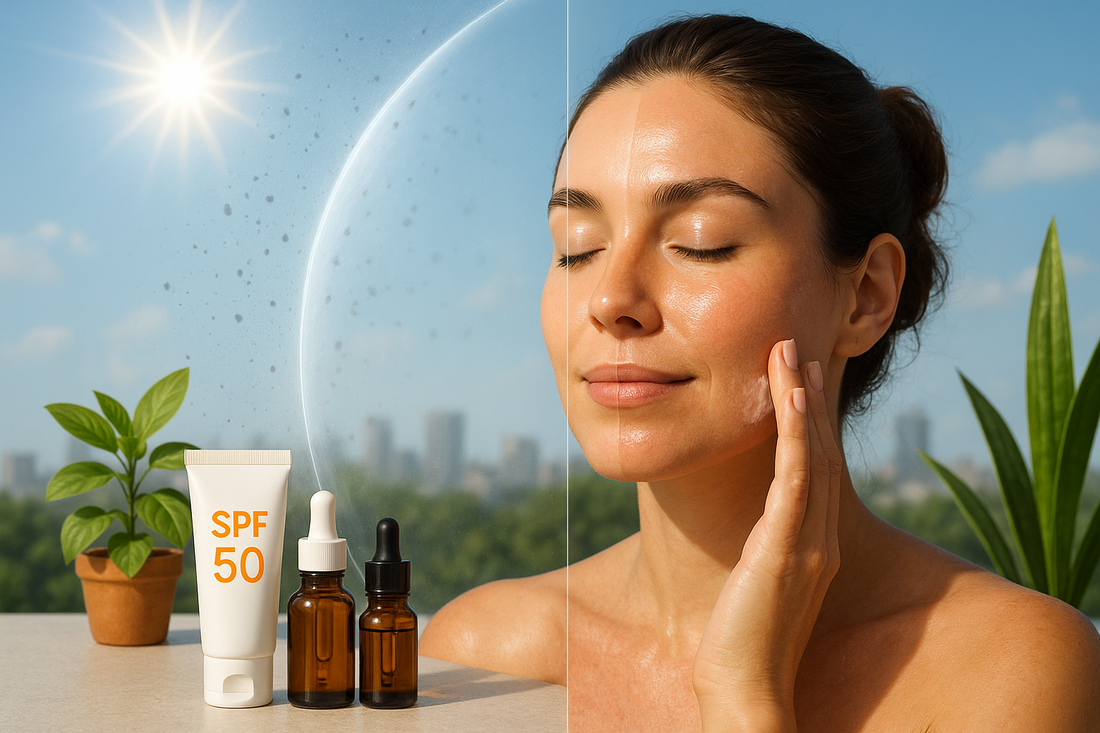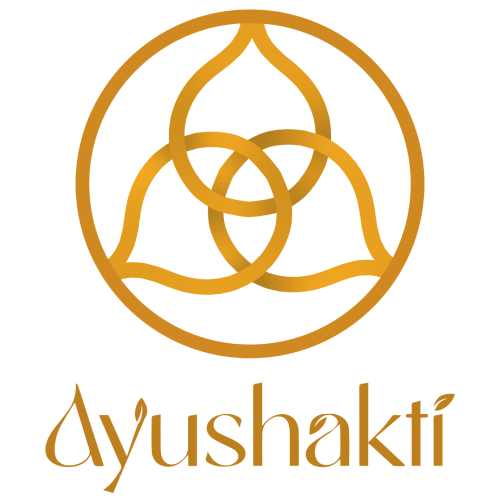
How to Protect Your Skin from Pollution and Sun Damage
Share
In today’s world, our skin faces unprecedented challenges. Urban pollution, harsh sunlight, and environmental toxins constantly threaten the skin’s natural barrier, leading to dryness, premature aging, acne, hyperpigmentation, and sensitivity. Protecting your skin is no longer just a cosmetic concern — it is a vital part of maintaining overall health.
While modern science emphasizes hydration, antioxidants, and physical barriers, Ayurveda provides holistic strategies that balance your doshas, detoxify the body, and rejuvenate skin naturally. This guide combines both perspectives to help you protect and strengthen your skin effectively.
Understanding Skin and Its Vulnerability
The skin is the body’s largest organ, accounting for roughly 16% of total body weight. It serves multiple functions:
- Barrier Protection: Shields the body from pathogens, UV rays, and pollutants.
- Regulation: Controls temperature through sweat and insulates through fat layers.
- Sensory Perception: Contains nerve endings for touch, pressure, and temperature.
- Detoxification: Eliminates toxins through sweat.
Layers of the Skin:
- Epidermis: Outermost layer; protects against environmental damage.
- Dermis: Contains collagen, elastin, blood vessels, and nerves; provides structural support.
- Hypodermis (Subcutaneous Layer): Stores fat and acts as a cushion against external trauma.
Pollution and UV exposure compromise all these layers, accelerating oxidative stress, inflammation, and skin aging.
How Pollution Affects Skin (Medical Perspective)
Air pollution contains particulate matter, nitrogen dioxide, and free radicals that penetrate the skin, causing:
- Oxidative Stress: Free radicals damage cells, break down collagen, and accelerate aging.
- Inflammation: Triggers acne, redness, and sensitivity.
- Clogged Pores: Dirt and pollutants mix with sebum, causing blackheads, whiteheads, and acne.
- Hyperpigmentation: UV exposure plus pollutants increases melanin production, darkening spots.
Research shows long-term exposure to pollution can thin the skin barrier, reduce elasticity, and increase the risk of chronic skin conditions.
Sun Damage and Skin
Excessive sun exposure contributes to photoaging — premature wrinkles, loss of elasticity, and pigmentation. UV rays penetrate deep into the dermis:
- UVA Rays: Penetrate deeply; cause wrinkles, sagging, and loss of collagen.
- UVB Rays: Cause sunburn, redness, and DNA damage in epidermal cells.
Symptoms of sun-damaged skin include dryness, fine lines, dark spots, and increased sensitivity.
Pollution and Sun Exposure on Skin
Ayurveda links skin health to the balance of doshas (Vata, Pitta, Kapha) and the condition of Rakta (blood), Twak (skin tissue), and Meda (fat tissue).
- Vata Imbalance: Dry, rough skin prone to fine lines and irritation.
- Pitta Imbalance: Sensitive skin, redness, sunburns, and pigmentation.
- Kapha Imbalance: Oily, sluggish skin prone to acne and dullness.
Pollution is considered a Kapha aggravator, leading to clogged channels and accumulation of toxins (Ama). Sun exposure aggravates Pitta, causing heat, inflammation, and pigmentation.
Ayurveda emphasizes detoxification, cooling therapies, herbal nourishment, and dosha-specific routines to protect skin naturally.
Daily Skin Protection
1. Cleansing and Detoxification
Medical Insight: Remove pollutants and dirt from the surface to prevent oxidative damage.
Ayurvedic Tip: Use natural cleansers like Reetha (Soapnut) or Multani Mitti. For oily, acne-prone skin, neem-based cleansers help detoxify the skin.
Method: Cleanse morning and night; use lukewarm water to avoid drying Vata skin.
2. Antioxidants (Ayurvedic Herbs)
- Amla (Indian Gooseberry): Rich in Vitamin C, protects from oxidative damage.
- Turmeric (Haridra): Anti-inflammatory, prevents pigmentation.
- Gotu Kola (Brahmi): Strengthens blood vessels and improves circulation.
Tip: Include antioxidant-rich foods in your diet and use herbal face masks.
3. Moisturization (Ayurvedic Oils)
- Vata Skin: Sesame or almond oil
- Pitta Skin: Coconut or aloe vera gel
- Kapha Skin: Light jojoba or sunflower oil
Apply oils after cleansing to lock in moisture and create a protective layer against pollutants.
4. Sun Protection
- Medical Insight: Sunscreens protect from UVA and UVB damage.
- Ayurvedic Tip: Apply natural cooling pastes such as sandalwood with rose water or turmeric with yogurt to reduce Pitta and sunburn.
- Lifestyle Measures: Wear hats, protective clothing, and avoid peak sun hours (10 AM–4 PM).
Dietary Guidelines for Skin Protection
1. Hydration
- Drink 8–10 glasses of water daily.
- Herbal teas with Tulsi, Licorice, and Amla help flush toxins and protect skin from oxidative stress.
2. Antioxidant-Rich Foods
- Citrus fruits, berries, green leafy vegetables, nuts, and seeds support skin regeneration and repair.
3. Dosha-Specific Foods
- Vata: Warm soups, ghee, cooked grains
- Pitta: Cooling fruits, cucumbers, coconut water
- Kapha: Light meals, greens, legumes
Avoid processed foods, excess fried items, and refined sugars, which increase inflammation and worsen pollution-related damage.
Ayurvedic Herbs and Oils for Pollution and Sun Protection
| Herb / Oil | Benefits |
|---|---|
| Amla | Vitamin C-rich, antioxidant, prevents pigmentation |
| Neem | Detoxifies skin, prevents acne from clogged pores |
| Sandalwood | Cools skin, reduces redness, improves glow |
| Brahmi | Strengthens circulation, rejuvenates tissues |
| Coconut Oil | Moisturizes, shields against environmental stress |
| Tulsi | Antibacterial, purifies skin from pollutants |
Home Remedies to Shield Skin
1. Turmeric and Yogurt Paste
- Mix 1 tsp turmeric with 2 tbsp yogurt; apply for 15 minutes.
- Benefits: Reduces sunburn and pigmentation, nourishes skin.
2. Aloe Vera and Rose Water Gel
- Mix aloe vera gel with rose water; apply to skin after sun exposure.
- Benefits: Cooling, hydrating, and reduces inflammation.
3. Green Tea Face Mist
- Brew green tea, cool, and spray on skin.
- Benefits: Antioxidant protection, soothes irritated skin.
4. Multani Mitti Mask
- Mix 2 tbsp Multani Mitti with rose water; apply for 10–15 minutes.
- Benefits: Absorbs pollutants, reduces oiliness, and tightens pores.
Ayurvedic Therapies for Skin Protection
1. Abhyanga (Oil Massage)
- Nourishes skin, improves circulation, and removes toxins.
- Oils like coconut, sesame, or herbal infused oils can be used depending on dosha.
2. Udwartana (Herbal Powder Massage)
- Stimulates lymphatic flow, removes excess toxins, and revitalizes skin.
3. Shirodhara
- Pouring herbal oils on the forehead to calm the nervous system and balance Pitta, indirectly protecting skin from stress-induced damage.
4. Rasayana Therapies
- Internal rejuvenation therapies using herbal decoctions like Chyawanprash enhance skin tone and resilience.
Lifestyle Practices for Skin Protection
- Sleep: Adequate sleep supports cell regeneration.
- Exercise: Improves circulation and oxygenates skin.
- Stress Management: Yoga, meditation, and pranayama reduce cortisol-related inflammation.
- Avoid Pollution Exposure: Stay indoors during heavy smog; wear masks in polluted areas.
Modern Skin Care Tips Combined with Ayurveda
- Gentle cleansers for removing pollutants.
- Moisturizers with natural oils.
- Antioxidant serums with herbal extracts.
- Face masks with turmeric, amla, and sandalwood.
- Avoid harsh chemicals that disrupt skin barrier.
Combining modern skincare with Ayurvedic herbs ensures optimal protection and rejuvenation.
Seasonal Ayurvedic Skin Care
| Season | Dosha Impact | Tips |
|---|---|---|
| Summer | Pitta | Cooling herbs, aloe vera, cucumber, light diet |
| Monsoon | Kapha | Exfoliate regularly, dry powders, herbal teas |
| Winter | Vata | Warm oils, nourishing foods, gentle hydration |
Seasonal adjustments prevent dosha imbalances that can worsen pollution and sun-related skin damage.
Conclusion
Protecting your skin from pollution and sun damage is a multi-layered process. While modern science emphasizes antioxidants, hydration, and sunscreen, Ayurveda teaches that internal balance, detoxification, and natural herbal therapies are essential for long-term skin health.
By integrating both approaches, you can maintain radiant, healthy skin, prevent premature aging, and shield your skin from environmental aggressors. Remember: Healthy skin starts from within, and consistent care is the key to lasting glow and resilience.
For regular health tips & updates visit Ayushakti’s Social Media Pages:
- Facebook – Ayushakti Ayurved | Facebook
- Instagram – Ayushakti Ayurved (@ayushakti)
- Pinterest – ayushaktiayurveda
Get all the updates about Ayushakti Ayurved on WhatsApp directly. Click here to Join our WhatsApp Channel
Ayushakti's mission is to help people in every way possible. Our Ayurvedic experts are available to give you a consultation either over the phone or through a video consultation. We recommend customised diets, home remedies, and detox therapies to help you recover from health problems. Book your consultation now!
If you would like to know the location or visit one of our centres, please click here: https://www.ayushakti.com/home/p/contact
For more information, write to us at info@ayushakti.com or call our toll-free numbers: 18002663001 (India) and +18002800906 (Global).
Blog Author: Dr. Ramchandra Konduskar
Expert Review: Dr Smita Pankaj Naram
Co-Founder, Ayushakti Ayurved Pvt Ltd
Disclaimer: This blog is for educational purposes only. Please consult an Ayurvedic practitioner before trying or consuming any medicines, home remedies or treatments mentioned in this blog. The information provided is not intended to diagnose, treat, cure, or prevent any disease.





